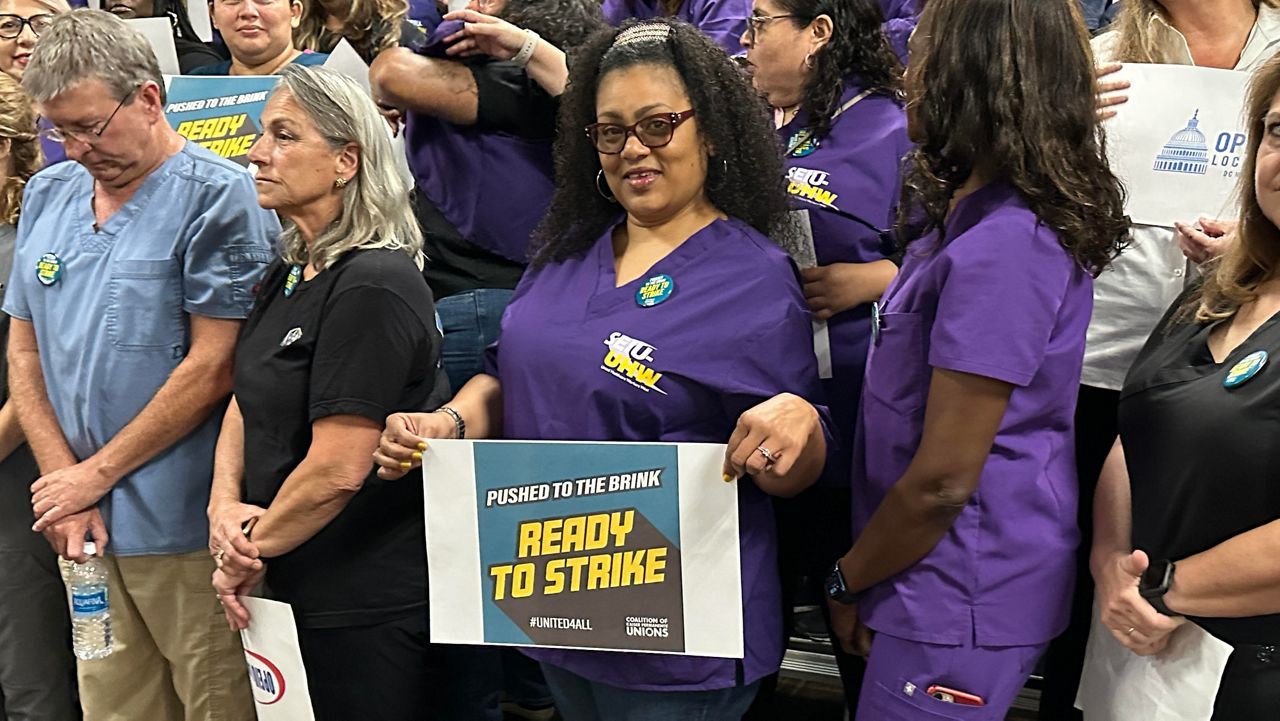Frontline health care workers at Kaiser Permanente announced Thursday that they will begin holding strike authorization votes on Saturday.
The Coalition of Kaiser Permanente Unions representing 85,000 housekeepers, respiratory therapists and other non-doctor staff are protesting unfair labor practices and could strike as early as Oct. 1.
If the strike takes place, it will be the largest health care workers strike in U.S. history.
“The people who are still here and who’ve worked through the pandemic are doing everything they can to provide the best quality health care to patients who are now being forced to wait longer than ever before, to have care delayed, to come to facilities across this country and not get the kind of services that they deserve,” said Dave Regan, president of SEIU United Healthcare Workers West, a union representing 58,000 of the 85,000 Coalition workers.
“We are determined, we are unified, we are exhausted, we are traumatized and we are ready to fight come Oct. 1 if Kaiser does not get their act together and do what’s right for this workforce, for their patients and for communities.”
Kaiser Permanente is one of the nation’s largest nonprofit medical organizations. It serves 13 million people at 39 hospitals in seven states and Washington, D.C., including California, Colorado, Hawaii, Oregon and Washington. Dozens of frontline workers on Thursday stood in solidarity with Coalition leaders sharing personal stories of understaffed hospitals and clinics they say are leading to long wait times, mistaken diagnoses and patient neglect.
The current contract for the Coalition workers has been in place since 2019 and is set to expire Sept. 30. The Coalition and Kaiser are five rounds into eight rounds of bargaining that began in April and led to an agreed-upon joint goal of hiring 10,000 new people for Coalition-represented jobs in 2023.
With 38 days to go until the current contract expires, the Coalition said Kaiser has yet to respond to its demands for annual pay increases of 7% in the first and second years of a new contract and of 6.25% in the third and fourth years, as well as a $25 hourly minimum wage. On Wednesday, Kaiser offered to establish a $21 minimum wage that would take effect in 2026, the unions said.
“Kaiser Permanente is fully committed to reaching an agreement with the unions affiliated with the Coalition just as we have done in every national bargaining since 1999,” Kaiser Permanente said in a statement. “Our priority is to reach an agreement that is mutually beneficial and ensures we can continue to offer our people market-competitive pay and outstanding benefits. We are confident that we will reach an agreement that achieves that goal before the contract expires on September 30.”
The statement added that "strike authorizations are a common bargaining pressure tactic" and "does not reflect any breakdown in bargaining, nor does it indicate a strike is imminent or will happen at all. It is a disappointing action considering our progress at the bargaining table. It does not reflect our commitment to reaching an agreement."
Kaiser Permanente says it has bargained in good faith with the Coalition and has not engaged in unfair labor practices. It also said it has filled 6,500 of the 10,000 positions the two parties had agreed upon and is offering wages up to 10% above local market rates.
The Coalition disagrees.
“This is about not succumbing to the worst trends we see in terms of the financialization of health care,” Regan said. “In the health care industry, there’s a trend going on across the country where although employers like Kaiser Permanente are officially nonprofit organizations, they really are nonprofit in name only.”
Regan said the chief executive of Kaiser Permanente earns $17 million annually and that almost 50 executives earn more than $1 million. Last year, Kaiser Permanente’s revenue was $95 billion.
He said Kaiser Permanente has refused to bargain in good faith and has failed to provide the Coalition with mandatory bargaining subjects, including information about operating margins in the various regions where it operates and costs. They have also failed to bargain with the unions’ representatives, declining to meet with them this week.
A frontline workers’ strike would shut down all of Kaiser’s facilities in six of the states where it operates, except Georgia.
The Coalition’s labor dispute is the latest in what has become known as hot labor summer in Los Angeles. Already, hundreds of thousands of LA workers are on strike in the city, including 11,500 members of the Writers Guild of America, 160,000 members of the Screen Actors Guild and thousands of hotel workers.



